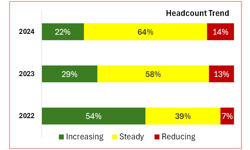The adage that there are only two certainties in life, death and taxes, is credited to Benjamin Franklin. Being, among other things, a politician, he overlooked the third absolute: economies are cyclical. Indeed, when our rulers claim they’ve created a new paradigm in which high growth can be sustained without inflation or debt, or their consequence, recession, it’s a sure sign that the bubble will soon burst.
Some people – a few very clever, most just lucky – make their fortunes in boom markets. When irrational exuberance leads assets to be priced above their fundamental value (think dotcom shares in the late 1990s, property in the mid 2000s), the brave hold while the cautious fold. Some of the brave enjoy further gains, but those who hold too long get burnt, and because pricing is irrational, luck rather than judgment determines who wins and who loses.
It’s actually much easier to make money at the tail end of a recession, when many assets are priced below fundamental value; it just takes a little longer. The tipping point at which a rational buyer would sell is in the future, rather than the past, and there will be plenty of time to spot its approach.
Economic growth will be slow this year and next, and possibly into 2012. But the US and UK in particular are heavily indebted, and the temptation not to keep interest rates low and quantitative easing in place for longer than is strictly necessary to ensure the growth is sustained, ‘accidentally on purpose’ creating inflationary pressures which make consumers feel good while also reducing the real-terms cost of repaying that debt, will be considerable. So I believe that the next six to twelve months will be a great time for smart, prudent publishers to do the ground work to position their businesses to profit from the next boom.
1. Buy – especially print assets and in cyclical sectors
If your balance sheet allows for growth by acquisition, or your shareholders or bank are up for financing growth, now’s the time to buy. Any business, or property, that can survive the biggest economic shock since WWII is pretty robust, so the risk-profile of such an acquisition will be low, as will the cost (or opportunity cost) of capital, at least in the crucial early years.
Moreover, the multiples of profit for which businesses change hands have reduced, particularly at transaction values above £10m, where private equity – normally a big part of the market – remains constrained by difficulties exiting current investments and obtaining debt. So it’s generally cheaper to buy now than a few years ago. This is doubly so in cyclical sectors that have experienced substantial profit declines over the past couple of years.
The combined effect of these two factors can be dramatic. Consider, for instance, a business that generated a £3m annual profit before tax in the good times, and was worth ten times profit - £30m. If, today, profits are down a third, to £2m, and you’re able to buy it for a multiple of seven, it could be yours for £14m – less than half its value at the peak.
There has been a lot less mergers and acquisitions activity in the mid to upper end of the market (£10m-plus) since the summer of 2008, because few owners want to sell at what they perceive to be the bottom of the market. But with recovery being slow, and shareholders being able to buy other assets at similarly depressed prices with the sale proceeds, I predict that deal flow will increase this spring and beyond.
2. Boot-strap new launches
I believe there may never be a cheaper time to launch a big, high-profile magazine or website than this year and early 2011 – especially if it’s a consumer magazine.
The last really big debut I can think of was IPC’s Look, three years ago. Retailers, supermarkets especially, know that high-profile, TV-advertised new titles drive footfall to the news fixtures and also compel rival publishers to invest in existing titles, all of which spells additional Retail Sales Value.
In recent years, the multiples’ own avarice in expecting unsustainable levels of investment in in-store promotional schemes (Retail Display Allowances by another name) for new titles has been one of the factors deterring publishers from launching. But the feedback I’m hearing is that attitudes are changing and if a publisher went to the newstrade with a proposition along the lines of: “Good news – we’d like to launch a new weekly and will spend £Xm on TV promotion. Bad news – this is conditional on an all-stores listing for the first two years, without any firm commitment to buy retail schemes”, that title would almost certainly make it to market – something that would have been unthinkable three years ago.
Other costs have come down too. Paper, for instance, which is a major cost for a new launch because of the need to flood the market with copy, is a lot cheaper than two years ago. TV airtime – ITV’s especially – is beginning to harden in price but is still close to a 20-year low point. Consider what magazine cover prices were in the late 1980s, compared with today, and you’ll see how TV advertising is a much more affordable option for publishers in real terms. Online, likewise, is a very much cheaper environment for marketing both websites and magazines than it was in the dotcom boom, more than a decade ago – as online publishers know to their cost.
3. Enter growth sectors
The ecosystem of a mature tropical rainforest is relatively stable. Due to the dense forestation and ground cover, few seeds or spores can reach the soil other than those from the existing flora. But if there’s a forest fire, or man clears the land then abandons it, a different mix of vegetation can grow in place of what once was there, in turn attracting and supporting different animal life.
The same applies to economies. In the boom years, most established businesses do very well, so it’s difficult for newcomers to compete effectively with them. Consumer and business behaviour doesn’t change much either, so relatively few new sectors or opportunities emerge. But when something dramatic happens that weakens the major players and frightens them off their growth plans, new trends and opportunities emerge and new players can profit from them.
4. Drive yields and prices
As we come out of recession, clients’ marketing budgets will recover, but they will have fewer media outlets available to them. The challenge for the brave is to profit from this imbalance by being unafraid to drive yields. Nowhere is this more true than with online display, rates for which tumbled at the first sign of downturn. I’m aware of publishers that are selling out their inventories, but at rates they would never have considered accepting three years ago. Hold your nerve on rates, and don’t be afraid of unsold stock.
5. Consider exiting counter-cyclical sectors
Irrespective of who wins the next election – and I doubt even the most fervent Labour voter would wager their own hard-earned money against a Cameron victory – the public sector is in for some pruning. What does this mean for the publishing industry? Well, I wouldn’t want to be publishing the Guardian over the next couple of years, already haemorrhaging cash, even before the loss of its multi-million pound public sector recruitment sections.
The Guardian is unlikely to be sold, but there are scores of specialist B2B publishers, in print and online, that could opt to sell now, close to the peak of the cycle. Granted, potential acquirers can also read the runes of national politics and may expect a downturn in trading, but many of those in the market to buy will be publishers of other recruitment-based professional titles in private-sector niches that experienced revenue declines approaching 70% year-on-year in the first half of last year and are prepared to risk a mistimed purchase to buy into assets that are counter-cyclical with those they already own.
6. ... if you stay in, slash and burn!
If you operate in a sector that is heavily dependent on public spending and opt not to sell, cut costs. Cut them to the bone. And then cut them again. Excise every single cost you can, and some you don’t think you can get away with. Because the storm that hit those who publish magazines, websites, newspapers and newsletters that depend on private sector recruitment between August 2008 and the end of 2009 is heading your way.
7. Bring forward capital expenditure
If you sense that your sector is out of the woods, and your balance sheet can stand it, consider bringing forward capital expenditure. Now’s the time to replace computer equipment, have your website upgraded, exchange the leasehold office for one you own, even upgrade your company car. Why? Because it’ll be cheaper now than in a couple of years’ time, when more companies will enjoy the confidence to invest that you’re experiencing today.
8. Invest in the fundamental health of the business
When the global banking system was in danger of collapse, and the UK lost 6% of its economic strength, from peak to trough, in barely more than a year, it’s understandable that most companies put off the kinds of discretionary spending that help them maximise revenues in the longer term, such as editorial and management training, recruiting key personnel, market research and consultancy projects focused on growth.
Given that the end of a recession is a great time for a land-grab, smart companies will use the next six to twelve months to make themselves fighting fit for that battle. And, as with capital spending projects, they’re likely to get some great deals from suppliers (myself included!).
9. Consider selling up
If you’ve made it through the tough times of the past eighteen months, congratulations. Given that most sectors of the economy can now expect a period of gradual recovery, perhaps followed by an inflationary phase, you may be surprised by my next suggestion: consider selling up.
My rationale is simple: while it’s possible that your business could be worth more in a year or two’s time than today, there has to be a risk, given the nation’s finances, that low-profile taxes such as that on capital gains will increase over the next year or two, so the total returns from selling may remain static, or possibly diminish. Moreover, the kinds of assets in which cashed-out entrepreneurs invest their wealth can still be obtained cheaply today: in particular, commercial property has fallen heavily in value and now offers attractive yields.
10. Don’t let cost back into your business
Finally, remember to keep the close eye on costs that we were all forced to develop during the recession. The temptation to let staff overspend, to allow suppliers to inch pricing back up to pre-downturn levels and to accept the first quote rather than seeking competitive tenders before awarding contracts must be resisted. Why? Because a key reason why well-run companies thrive when recessions end is that they succeed in locking in the lower costs they secured in the downturn, while benefitting from recovering revenues: a fail-safe recipe for increased margins.










